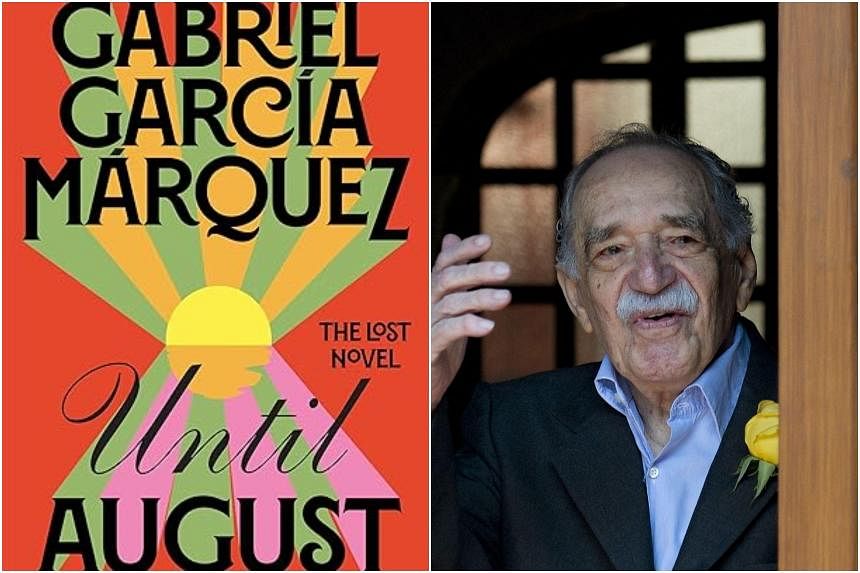Until August
By Gabriel Garcia Marquez, translated by Anne McLean
Fiction/Viking/Hardcover/129 pages/$22.40/Amazon SG (amzn.to/3w2Th1g)
4 stars
Posthumous publication is always thorny, especially when the author in question wanted his or her unfinished manuscripts destroyed upon his or her death.
After British fantasy writer Terry Pratchett’s death in 2015, the hard drive containing his drafts was crushed by a steamroller, as per his request.
On the other hand, Prague-born writer Franz Kafka’s last wish to have all his work burnt unread was disregarded by his friend Max Brod, who salvaged what would go on to be some of Kafka’s best-known work, including The Trial (1925) and The Castle (1926).
Such was the dilemma faced by the sons of Gabriel Garcia Marquez, the Colombian Nobel Laureate whose works such as the magical realist epic One Hundred Years Of Solitude (1967) helped fuel the Latin American boom of the 1960s and 1970s.
In his final years, as he struggled with dementia, Garcia Marquez had been working on one last novel.
Before his death in 2014, he deemed it unpublishable: “This book doesn’t work. It must be destroyed.”
Ten years later, his sons Rodrigo and Gonzalo Garcia Barcha have chosen to publish this “lost novel” in an “act of betrayal”, which – as they argue in a preface – places the pleasure of their father’s readers before all else.
However ethically questionable this may be, it is fitting that the novel in question is about a recurring act of betrayal, committed in memory of a deceased parent and in the name of an elusive pleasure.
In the novel, a woman called Ana Magdalena Bach takes a ferry to an unnamed Caribbean island to visit her mother’s grave every Aug 16, the anniversary of her mother’s death. Each time, she reads a different novel, drinks at a different bar and has a one-night stand with a different man.
Ana Magdalena, who is 46 when the novel opens, has been happily married for nearly three decades with two grown children. Yet, every August, she engages in this inexplicable, inexorable ritual of transgression, the effects of which begin to ripple outwards into her life off the island.
This is far from the lost masterpiece that publicity hype would have you believe. Readers hoping for the heights of One Hundred Years Of Solitude or Chronicle Of A Death Foretold (1981) will be sorely disappointed.
It is worth recalling, however, that the last work of fiction Garcia Marquez published in his lifetime was the dismal Memories Of My Melancholy Whores (2004), about a 90-year-old man who falls in love for the first time with a 14-year-old prostitute.
Compared with that, Until August is a better coda to his extensive, extraordinary oeuvre. It reveals at times a striking poetic beauty, such as in the opening scene when Ana Magdalena travels in a dilapidated taxi through “streets of burning sand beside a sea in flames” to pick up the bouquet of gladioli that she lays every year on her mother’s grave.
Its sex scenes are not so much sensual as laughably cringeworthy, with lines such as “at his first thrust she felt herself die from the pain”.
This constant puncturing of erotic mystique seems, however, of a piece with Ana Magdalena’s own insecurities and repression, juxtaposed against how the island, despite the glossy growth of its tourism sector, seems otherwise to be stalled in a state of destitution.
The tale’s unexpected climax takes a macabre yet oddly satisfying turn. The pleasure that the author’s sons imagined in exchange for their betrayal is slight, but better than none at all.
If you like this, read: Love In The Time Of Cholera by Gabriel Garcia Marquez, translated by Edith Grossman (1988, reissued 1997, Everyman, $20.16, Amazon SG, go to amzn.to/4aHI7yg). After Florentino Ariza sees his childhood sweetheart Fermina Daza wed to another man, he embarks on hundreds of affairs, many of them disastrous. In his 70s, he reunites with a widowed Fermina.


